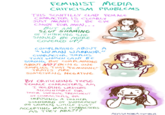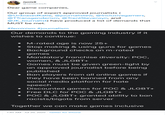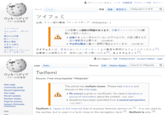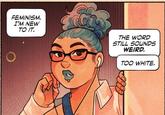| Navigation |
| About • Online History • Online Presence • Highlights • Criticisms • Search Interest • External References • Recent Images • Recent Videos |
About
Feminism is a socio-political movement that centers around the idea of improving the living standards and cultural opinion of women, both through changing female representation in the media and legislation. Individual feminists and groups vary widely with their opinions on specific issues pertaining to gender equality and society, with many subcategories and waves of feminism.
Online History
Pre-Internet
Feminism began to develop as a philosophical idea in the early 19th century, encouraged by works such as Soujorner's "Ain't I a Woman"[1]. In the 20th century, feminism developed into a social movement through activists in the suffrage movement. The movement is oftentimes described in "waves"[2], starting with the first wave and continuing on to the third/fourth waves, although there is much debate over how the waves should be categorized.
The Bechdel Test
Main article: Bechdel Test
The Bechdel Test was first introduced by author Alison Bechdel in a strip from her 1985 comic collection Dykes to Watch Out For, although the comic credits her friend Liz Wallace for coming up with the idea. The comic lays out the 3 basic requirements needed to pass the test.
1. Has two female characters
2. Who talk to each other
3. About something other than a man
 ":/photos/718730
":/photos/718730The earliest online appearence of the comic was on August 16th, 2005, by Bechdel via Flickr and Blogspot. As of March 2014, the image has over 230,000 views. On April 11th, 2010, bechdeltest.com was created to compile a list of movies that passed the test, as well as movies that only partially pass. Other derivative tests include the Finkbeiner Test for media about female scientists, and the Russo test for LGBT characters.
Female Identity
“There are No Girls on the Internet” is a tongue-in-cheek adage which implies that there are no female entities actually participating in online activities, especially when it comes to anonymous exchanges in chatrooms and discussion forums. The outdated myth also jests that the Internet is essentially a “sausage fest” dominated and defined by male internet users and a smaller population of male trolls or griefers who pose as women in pursuit of lulz.
The origin of the myth can be traced back to the male-prevalent days of Usenet, particularly in the virtual Multi-User Dungeons (MUDs), a genre of text-based online role-playing games and predecessor to MMORPG like World of Warcraft. During this era, it became a routine practice among male players to falsely pose as girls to solicit gifts or other unfair advantages. Such prevalence of gender deception in MUDs was first noted in 1993 by American sociologist Amy Bruckman in her research paper “Gender Swapping on the Internet”:
“Many people, both male and female, enjoy the attention paid to female characters. Male players will often log on as female characters and behave suggestively, further encouraging sexual advances. Pavel Curtis has noted that the most promiscuous and sexually aggressive women are usually played by men. If you meet a character named “FabulousHotBabe,” she is almost certainly a he in real life."
The practice has since remained a popular trolling technique in online conversations and more recently, as an integral part of griefing in the context of online gaming. In addition, such stereotype of the average Internet user as “a geeky male who is single and desperately seeking interaction with the other sex” became further amplified and perpetuated through its frequent portrayal in popular TV shows, films and novels.
Cyberfeminism
The feminist movement on the Internet began to thrive with the rise of blogging in the late 1990s, burgeoning into a network of women's interest blogs and communities such as The F Word, Feministing, XOJane and Jezebel by the late 2000s. Tumblr is another site notorious/famous for its large feminist community.
Online Presence
Modern-day feminism has developed a fairly large presence online, especially on sites such as Tumblr and the feminist blog Jezebel. There is also a subreddit devoted to the topic.
Anita Sarkeesian
Main article: Anita Sarkeesian
Anita Sarkeesian is a videoblogger and media critic best known as the host of Feminist Frequency[1][2], a web series in which Sarkeesian reviews and analyses common tropes in popular culture from a feminist viewpoint. In 2012, she was introduced to a larger audience after launching a Kickstarter campaign to fund a new web series exploring the negative tropes surrounding women in video games. She has been the target of large amounts of criticism, including a flash game on Newgrounds called "Beat up Anita Sarkeesian.", though it was removed the next day. In response to this, comments and ratings are disabled on all of her videos, which has elicited concerns that Sarkeesian is censoring or otherwise silencing dissent.
Highlights
Mary Sue
Mary Sue is a negative term used in fanfiction and literary criticism to describe an original character that is often overly idealized or assumed to be a projection of the author. When used by a male author, the character is referred to as a Gary Stu or Marty Stu. The term is considered by some to be misogynist due to how easy it is to write off a female character as a Mary Sue, but a male character can have the same qualities and be regarded as a normal character.
Feminist Ryan Gosling
Feminist Ryan Gosling is a single topic Tumblr showcasing a series of image macros based on stillshots of the actor seemingly submerged in thought and various excerpts from feminist literature works. The character of Feminist Ryan Gosling can be interpreted as the sensitive counterpart of the FuckYeahRyanGosling image macro series.
Make Me A Sandwich
“Make me a sandwich,” sometimes deliberately misspelled as “Make me a sammich,” is a catchphrase often used by male internet users to mock, discredit or annoy female internet users, playing off of the sexist trope which states that women belong in the kitchen.
Feminist Nazi
Feminist Nazi is an advice animal image macro series featuring a photograph of Australian reality TV star Layla Joyce Subritzky from the ninth season of Big Brother Australia. The captions typically depict a naive approach to stereotypical feminist ideas, in a similar manner to College Liberal.
#SorryFeminists
#SorryFeminists is a Twitter hashtag that is used to poke fun at preconceived notions about feminist codes and beliefs.
Who Needs Feminism?
Who Needs Feminism? is a movement organized via a single topic Tumblr and Facebook page that feature photos of people holding handwritten signs explaining why they need feminism and why feminism is important to them.
Privilege Denying Dude
Privilege Denying Dude is a series of image macros centered around a guy in a suit posing with his arms crossed, with captions satirizing the typical white male’s patronizing viewpoint on a range of politically sensitive issues like racism, homosexuality and feminism. This meme functions similarly to the feminist bingo card or the oft-linked article “Derailing for Dummies”, offering quick & funny punchlines (EX: “but what about the men?” or “what about the racism that white people experience?”) for those trying to troll serious discussions about women's issues and racial equality.
Hey Girls, Did You Know…
"Hey Girls, Did You Know…" is a series of multi-pane exploitable images featuring webcam photos of Tumblr bloggers accompanied by captions commentating on the issue of self-image or body-image, similar to another photo set series known as Dear Girls. Many instances parody the original image, which poked fun at cleavage shots that are frequently uploaded by female Tumblr users.
When Did This Become Hotter Than This?
“When Did This Become Hotter Than This?” is an image macro series comparing two sets of photographs featuring celebrities or famous subjects from two distinct time periods or generations. What began as a commentary on the ever-changing definition of beauty across generations, eventually led to online debates regarding the controversial issue of body images and even expanded across areas outside of celebrities, such as cute animals and inanimate objects.
Slut Shaming
“Slut shaming” refers to the practice of criticizing a woman for engaging in certain sexual behaviors outside of traditional gender roles, whether it be actual or presumed based on her manner of dress, speech or personality. Online, such practice has been discussed in the context of cyberbullying, as some cases have led to teenage girls committing suicide, and it remains a popular debate topic among social justice bloggers.
Check Your Privilege
“*Check Your Privilege*” is an online expression used mainly by social justice bloggers to remind others that the body and life they are born into comes with specific privileges that do not apply to all arguments or situations. The phrase also suggests that when considering another person’s plight, one must acknowledge one’s own inherent privileges and put them aside in order to gain a better understanding of his or her situation.
The Hawkeye Initiative
The Hawkeye Initiative is an art movement in which artists replace female super hero characters shown in impossible body positions with the male Marvel superhero Hawkeye, one of The Avengers.
Mansplaining
Mansplaining is an Internet slang term used to describe condescending and inaccurate explanations that are given under the assumption that the audience is entirely ignorant on the subject matter or topic. The name stems from an online behavior commonly exhibited by male newbies on female-oriented discussion forums, however, any member of either sex can be guilty of mansplaining.
This Is What I Was Wearing
“This is What I was Wearing (Tell Me I Asked for It, I Dare You)” is the slogan that was originally seen on a sign held by a feminist activist at the 2011 SlutWalk in New York City. Online, both the slogan and the photograph of the sign have been parodied through image macros and photoshopped images.
Feminist Taylor Swift
Feminist Taylor Swift is a novelty Twitter account that parodies song lyrics of the American pop singer with feminist commentaries on romantic ideals that may be deemed patriarchal or heteronormative.
Criticisms
Feminists have received large amounts of criticism, both online and in real life. The men's rights movement (MRM) was founded in the early 1970s[3] as a countermovement, claiming that men do not hold greater wealth, power, or societal privilege over women. Instead, it is the other way around. The MRM has grown greatly with a strong online presence, with mixed results. Feminists criticize the MRM as misogynystic and trying to distract people from feminist issues. Several MRM groups have been labeled as hate groups by the Southern Poverty Law Center.[4][5] Since the early 2010s, the feminist movement on the Internet has come under criticism, mainly from its counterpart activists within the so-called Manosphere.
The Men's Rights Movement
The men’s rights movement (MRM) was founded in the early 1970s[3] as a reactionary movement to feminism with an aim to dispute the assertions that men hold greater wealth, power, or societal privilege over women.
C Plus Equality
In December 2013, 4chan users announced the launch of a novelty programming language dubbed "C Plus Equality" in a satirical response to blogger Arielle Schlesinger's proposal for a feminist programming language that was posted on Hastac[1] a few days prior.
Operation Fourth Wave Feminism
In January 2014, users on the website 4chan launched a series of false flag campaigns known as "Operation Fourth Wave Feminism"[12] in an attempt to undermine various feminist and social justice movements. The first hoax, dubbed "Operation Bikini Bridge", aimed to spread pictures prominently displaying a horizontal line that is formed on a woman’s bikini bottoms as a result of the suspended gap between the bikini and the lower abdomen. The goal was to create a rift between second and third wave feminists around the sexualization of thin or physically fit female bodies.

On January 31st, a thread was created on 4chan to announce the launch of Operation Freebleeding, which would attempt to promote abstaining from using feminine hygiene products during menstrual period on various social media platforms, under the pretense of promoting feminism and self-empowerment.

Fake Thought Catalog Essay
On March 15th, 2014, the pop culture blog Thought Catalog[13] published an article titled “5 Things Women Need To Do In Their 20′s (Or Else The Suffragists Died For Nothing)”, which contained a list of recommended lifestyle choices for young women who wish to reap the benefits of the feminist movement, urging them to be sexually promiscuous, attend parties and major in women’s studies. The same day, Body Building Forums[7] member AryanofValhalla posted a thread announcing that he had written the article as a satire under the pseudonym Anne Gus and had received a notification that it had been published.

In the coming days, several news sites published article about the essay, including Time,[9] Gawker[10] and the New York Daily News.[11] On March 18th, Thought Catalog[8] editor Chrissy Stockton followed up with an article to claim that she had known the article was satirical and that the blog does not have a gender bias in its coverage of feminism.
TIME's 2014 Word Banishment Poll
On November 12th, 2014, TIME Magazine[14] unveiled its fourth annual word banishment poll, asking its readers to choose one neologism or buzzword from this year that should be banned from the English language in 2015. The list featured a number of internet slang terms and social media colloquialisms, including bae, basic, i can't even, literally, om nom nom nom, said no one ever and last but not least, feminism.


In the following 24 hours, several threads were launched on 4chan's /b/ (random), as well as on 9gag, to coordinate a poll-bombing campaign to make the word "feminist" the most bannable word of the year. The latest /b/ raid was subsequently reported on by Jezebel[16], Mashable[15], Daily Beast and The Mary Sue[17], as well as some mainstream news outlets, such as PBS NewsHour, The Independent and New York Magazine. As of November 13th, 7:24 pm (EST), the word "feminism" remains in the lead with approximately 49% of the total votes casted online.


![3b6.jpg [a / b / C / d / e / f / g / gif / h / hr / k / m / 0 / p / r / s / t/u/v/vg/vr / toy trv / tv vp wsgx / g] [i / ic] [rSk] [S4S [㎝ /hrm / lgbt y] [3 / adv / an / asp biz ogl ck/CO/diy / fa / fit gd / hc / int /jp/lit mlp / mu / n / out po pol sci soc / sp / tg / Settings) [Home that to our Face, not f----- /b/ - Random The stories and information posted here are artistic works of fiction and falsehood. Only a fool would take anything posted here as fact Please support 4chan by disabling your ad blocker on "4chan.org/*, purchasing a self-serve ad, or buying a 4chan Pass. [Post a Reply] 11/09/14 Blog Post: Enhanced Thread Watcher, unique posters, and delayed pruning 100114 Happy 11th Birthday. 4chan! 1001/14 News Post: HAPPY 11TH BIRTHD Hide) [Show Ai Please support 4chan by disabling your ad blocker on 4chan.org/", purchasing a self-serve ad, or buying a 4chan Pass. Return [Catalog] [Bottom] [Updatel [Auto] 19/8/1314 File: 2uvqZz5.ipg (132 KB, 500x667) Anonymous (ID: a9pHwPX ) 11/12/14(Wed)13:53:32 No.579054372 790s4sssms790s45532257905470822579055163 Vote feminist for worst word 2014 O Anonymous (ID: C ARNO) 1 1/1 2/14(Wed) 1 3:54:00 No.5790544 19 >>579054557 >2579054594 579055246 the t--- look shoped Anonymous (ID: a9pHwPX) 11/12/14(Wed)13:54:19 No.579054462 Forgot link http://time.com/3576870/worst-words-poll-2014/ Anonymous (ID: 4pwMblzu) 11/12/14(Wed)13:54:47 No.579054535 File: BANANA CYRUS.png (1.25 MB, 615x800) You obviously have never spoken to a feminist (Which I guess is technically a win for you but NEVER THE LESS!), they are ADAMANT about preserving the feminism label, even though they claim to be about equality, it is one of the reasons me and others hate them, because despite their talk of equality they still cling to gendered terms and issues and that includes the word feminism. The dumb bitch man hating feminists will cling to the feminist term for dear life, while the reasonable ones who actually acknowledge gender equalities on both sides but choose only to focus on female issues may adopt different names (as many have alreayd done), but I have no problem with that, because they aren't the ones I hate, it is specifically the ones who feel the](https://i.kym-cdn.com/photos/images/newsfeed/000/864/135/3b6.jpg)
Search Interest
External References
[1] Wikipedia – Ain't I a Woman?
[2] Wikipedia – Third-wave Feminism
[3] Wikipeida – Men's rights movement
[4] Southern Poverty Law Center – Intelligence Report, Spring 2012, Issue Number: 145 Men’s Rights Movement Spreads False Claims about Women
[5] Radfem News Service – SPLC Names Men's Rights Activists (MRAs) as Hate Group
[6] Wikipedia – Cyberfeminism
[7] Google Cache – Body Building Forums OMFG I wrote a satire article
[8] Thought Catalog – Time Published a Fake Story About Me
[9] Time – Thought Catalog Accidentally Publishes Fake Feminist Essay
[10] Gawker – Gym Bro Successfully Gets Fake Feminist
[11] New York Daily News – Thought Catalog publishes satirical feminist essay
[12] Wikipedia – Operation Fourth Wave Feminism
[13] Thought Catalog – 5 things women needs to do in their 20s
[14] TIME – Which Word Should Be Banned in 2015?
[15] Mashable – 4Chan is trying to get the word 'feminist' banned
[16] Jezebel – 4Chan Is Why 'Feminist' Is Winning the TIME Poll of Words to Ban
[17] The Mary Sue – Update: “Feminist” Is Most Likely Winning that Stupid Time Magazine Poll Because of 4Chan























Comments ( 384 )
Sorry, but you must activate your account to post a comment.
Please check your email for your activation code.